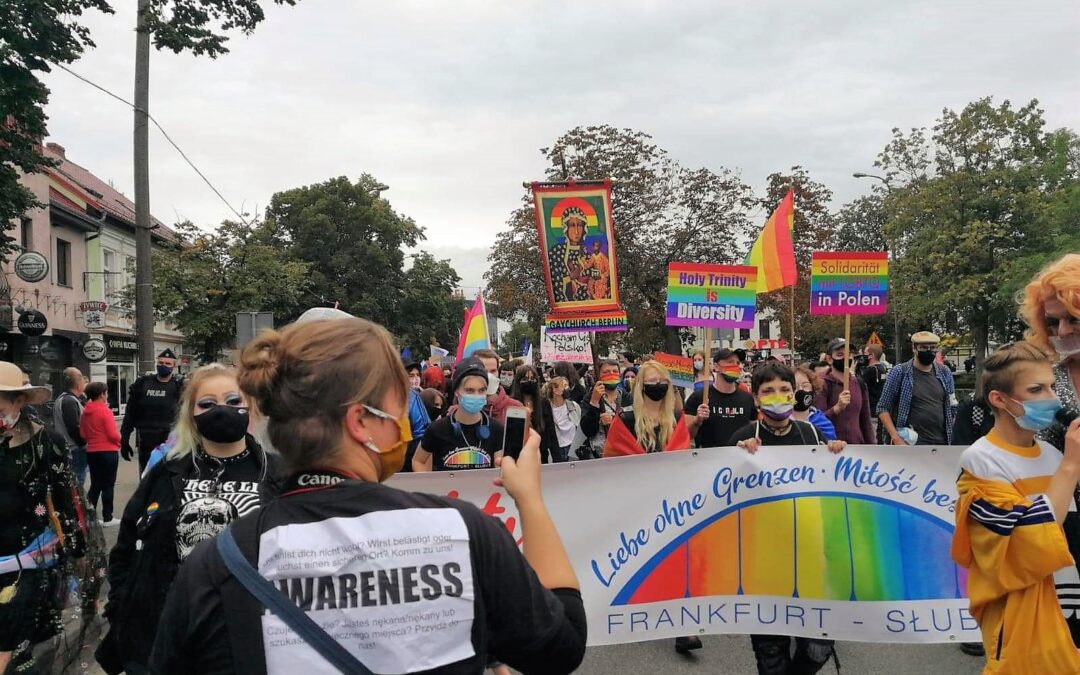The first ever joint Polish and German LGBT parade has taken place today. The march set off from Heroes’ Square in the Polish town of Słubice, before marching across the bridge over the Oder River that marks the border with Germany and then entering Frankfurt (Oder) on the other side.
The event was organised by Słubice Frankfurt PRIDE, a group that brings together people from both sides of the border. Their aim was to both draw attention to local issues – such as the need for more LGBT-friendly spaces in the twin towns – as well as protest against the ongoing government-led anti-LGBT campaign in Poland.
Poland was earlier this year ranked as the worst country in the European Union for LGBT people, following repeated attacks by the ruling Law and Justice (PiS) party and the Catholic church on what they claim is an imported “LGBT ideology” that threatens the country.
Today’s parade was met with a small counter-demonstration by protesters who said they wanted to defend traditional Christian values. Police were present to make sure there were no clashes, after recent violence at some other LGBT marches in Poland.
Jesteśmy dziś na polsko-niemieckim #Słubice #Frankfurt #pride. Jest kolorowo i międzynarodowo. 🌈💪#lgbt pic.twitter.com/YrEHV6atsI
— Magazyn LGBTQIA "Replika" (@magazynreplika) September 5, 2020
“This is our response to what is happening in other parts of Poland, where LGBT-free zones are being created,” Kacper Kubiak of the Institute of Equality, an LGBT rights organisation, told Gazeta Lubuska. A number of local authorities in Poland have declared themselves “free from LGBT ideology”.
Openly, an LGBT news service, claimed that 2,000 people took part. But a reporter on the ground for Polish news site Onet put the figure at around half of that, while Gazeta Lubuska, a local newspaper, said that it was in the hundreds. This still made it the largest LGBT event to have taken place in Słubice.
The organisers had beforehand called on participants to adhere to social-distancing requirements, meaning staying 2 metres apart on the Polish side of the border and 1.5 metres in Germany. They said that local authorities in both towns had cooperated in preparing the event.
Among those in attendance was local left-wing MP Anita Kucharska-Dziedzic. “When the human rights of LGBT people are violated, we are all diminished,” she tweeted. “We march today [for] equality, tolerance and respect.”
W #Słubice i #Frankfurt maszerujemy dzisiaj mówiąc o równości, tolerancji i szacunku. Kiedy naruszane są prawa człowieka osób #LGBT, wszyscy jesteśmy pomniejszani 🏳️🌈 pic.twitter.com/vf5ylYVukV
— Anita Kucharska-Dziedzic – posłanka na Sejm RP (@AnitaKDZG) September 5, 2020
Among the banners held by the marchers was a controversial image of the Virgin Mary and Jesus with LGBT rainbows added to their halos. It has become a common sight at LGBT parades in Poland.
The design is an adaptation of Poland’s holiest Catholic icon, the Black Madonna of Częstochowa. Earlier this year, three LGBT activists accused of being responsible for creating the image were indicted for the crime of offending religious feelings.
As the parade passed through the streets of Słubice, some protesters expressed their opposition. Among the banners visible was one declaring “No to gender ideology” and another saying “Leave our children alone”.
Through a megaphone, one protester declared that “most rapes are committed by homosexuals” and “homosexuals want to legalise paedophilia”, reports Gazeta Lubuska.
The newspaper also reports that the mayor of Frankfurt (Oder) and the deputy mayor Słubice said they accepted the LGBT marchers’ demands, which include measures to end discrimination and a joint action plan to recognise and educate on different gender identities and sexual orientations.
“I’m here to tell you we’re not neutral,” said Frankfurt’s mayor, quoted by Gazeta Lubuska. “If there are two sides, we are on yours.”
To which the Pride marchers have their own response… pic.twitter.com/hXMfl555Ml
— Openly 🏳️🌈 (@Openly) September 5, 2020
Poland has recently witnessed a growing number of LGBT parades. Last year, a record 24 were held, many in smaller towns that were hosting them for the first time.
During this year’s coronavirus lockdown, all LGBT marches were cancelled. However, they resumed last weekend with an Equality Parade in Kraków (although, on account of sanitary requirements, it was a “stationary march” in the city’s market square rather than passing through the streets).
“We will never let ourselves be crammed into the closet again,” one of the organisers told the crowd in Kraków. “We will scream even louder. We will not be polite, because we were already polite 10, 20, 30 years ago. We won’t wait forever for you to start treating us like people.”
A new, more radical and provocative form of LGBT activism has recently emerged in Poland, in turn meeting with a forceful response from the authorities.
At the same time as Słubice’s event was taking place today, the southwestern city of Katowice was also holding its fourth ever Equality Parade. It was met by a much smaller nationalist counter-demonstration, reports OKO.press
Main image credit: magazynreplika/Twitterexce

Daniel Tilles is editor-in-chief of Notes from Poland. He has written on Polish affairs for a wide range of publications, including Foreign Policy, POLITICO Europe, EUobserver and Dziennik Gazeta Prawna.




















